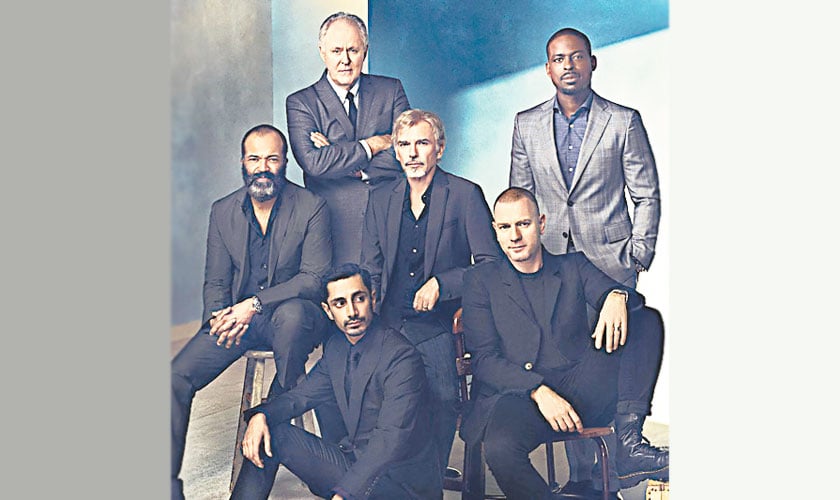Riz Ahmed, the 34-year-old actor who rose to the top of the acting table on the back of a riveting performance in HBO’s The Night Of in the summer of 2016, is back in the spotlight. With a supporting role in Lena Dunham’s Girls and an appearance on the cover of Time Magazine (along with text written by Hamilton creator Lin-Manuel Miranda), it seemed as if Ahmed could not fly higher but it looks like he can.
SoundBytes
The actor/rapper joined Ewan McGregor, Billy Bob Thornton, Sterling K. Brown, John Lithgow and Jeffrey Wright to talk about loser roles, early struggles and the research that went into his breakthrough role of Naz Khan.
Riz Ahmed, the 34-year-old actor who rose to the top of the acting table on the back of a riveting performance in HBO’s The Night Of in the summer of 2016, is back in the spotlight. With a supporting role in Lena Dunham’s Girls and an appearance on the cover of Time Magazine (along with text written by Hamilton creator Lin-Manuel Miranda), it seemed as if Ahmed could not fly higher but it looks like he can.
For one thing, Ahmed who goes by the alias of Riz MC in the music world and is a member of the music group, Swet Shop Boys, is a terrific performer, a glimpse of which was seen in London earlier this month and one that earned him and his band a thrilling review in The Guardian newspaper.

City of Tiny Lights, a British film starring the actor that released this April also picked up decent reviews and as the first half of the year comes to a close, Ahmed’s performance in the HBO limited series is still on everyone’s minds and has put the actor on the shortlist for plenty of awards.
The most recent example of this emerged when Ahmed joined five other industry icons such as Ewan McGregor, Billy Bob Thornton, Sterling K. Brown, John Lithgow and Jeffrey Wright for The Hollywood Reporter’s annual Drama Actor Roundtable discussion.
During the conversation, while discussing roles that make him say ‘not this again’, Ahmed revealed: “When you first start seeing gay characters in mainstream cultures or black characters or Muslim characters, they can start off as the stereotypical portrayal — it’s the cab driver, the shopkeeper, the drug dealer. And then sometimes, hopefully, you move beyond that, and it’s still storylines that are tied to that character’s ethnicity or their sexuality, but they’re working against those stereotypes. I was lucky that I came into the game just when we were moving from that stage one caricature into stage two. So a lot of my early work deals with the issues around the war on terror or Islamophobia, but I’m proud to say it deals with and engages those issues in creative ways and I hope in ways that move us forward rather than doubling down on lazy stereotypes. But yeah, there was a lot of, like, Terrorist No. 3 stuff — I just made a decision I wasn’t going to do it. I thought, ‘I’d rather be broke’.”
Ahmed went on to discuss the inexhaustible amount of research and preparation that he did for his role of Naz Khan in The Night Of which included hanging out at the the Rikers Island prison and taking copious amounts of notes.
“I went to the Rikers Island prison, which thankfully I hear they’re closing because some of the stories that I heard there were wild. Forget turning up there as a new inmate; if you turn up there as a corrections officer, the inmates will test you. So, if you’re a new guy, the inmates will start messing with you or just disobeying you or being verbally abusive, and you’ve got to prove yourself. And I said, ‘Well, what does that mean? Are you extra harsh in laying down the rules?’ One guy goes, ‘No, you have to fight them.’ I was like, ‘How do you mean? Psychologically?’ He’s like, ‘No, you take them out in cuffs, you go out into the corridor, you make sure the cameras are shut off, and you uncuff them and go at it. That’s how you win respect as a C.O.’ So there’s a kind of crazy, gladiatorial, dog-eat-dog situation there. Interviewing people who have been through the prison system, those stories are all very flashy and they stick with you, but it was [also] the detail of things, like how people just let go of family because it’s too painful after a while. I’d go nuts and record people for hours.”
When asked if the current political climate change has an impact on his selection of roles, Ahmed observed, “I do believe it’s an artist’s responsibility to engage with the times we’re living in. But it’s a weird thing. Certain stories or certain storytellers are encumbered with the responsibility of being seen as political whether they like it or not.”
He added: “what we think of as mainstream stories or stories that aren’t political are very political in their absence of interrogating the status quo.”
– With information from The Hollywood Reporter